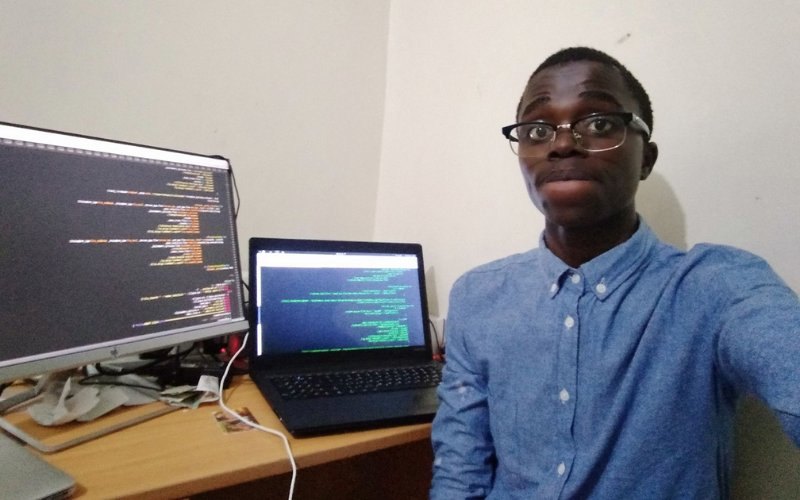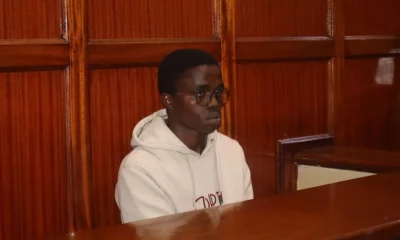Business
Deadly Digital Doorway: How a KSh11.4 Million Betika Cyber Breach Exposed Catastrophic Cracks in Kenya’s Fintech Fortress

Investigation Reveals How Single Telegram Bot Pierced Multi-Million Shilling Security Architecture, Raising Existential Questions About Gambling-Banking Industrial Complex
NAIROBI, Kenya — In the dimly lit corridors of Tatu City’s residential towers, a 26-year-old university dropout was quietly dismantling the digital defenses of one of Kenya’s most profitable industries, transaction by transaction, until the morning of August 30, 2025, when detectives kicked down his door and found what authorities now describe as the smoking gun of Kenya’s most audacious betting heist.
What they discovered inside Seth Mwabe Okwanyo’s apartment reads like a cybercrime thriller: high-end servers humming with algorithmic precision, multiple laptops arranged in a makeshift command center, routers blinking in synchronized rhythm, a money-counting machine, and scattered motherboards, the digital entrails of a sophisticated penetration operation that had already bled KSh11.4 million from the gambling giant Betika through a catastrophic vulnerability in its payment infrastructure.
But the real story is not about Okwanyo.
It is about the gaping technical chasm that allowed him to succeed, a systemic failure that has sent shockwaves through Kenya’s banking establishment and exposed the terrifying fragility of the country’s gambling-fintech nexus, a multi-billion shilling ecosystem built on foundations that now appear to be made of sand rather than silicon.
Court documents filed at Milimani Law Courts paint a damning picture of the security architecture, or lack thereof, that protected transactions flowing between Betika, Afrisend Money Transfer Limited, and Diamond Trust Bank.
On July 16, 2025, in the space of what investigators estimate was mere minutes, Okwanyo allegedly unleashed thirty-eight fraudulent transactions through DTB accounts linked to the Pesalink platform, each one slipping past what should have been multiple layers of detection, each one bypassing internal transaction visibility controls that are supposed to be the financial sector’s first line of defense.
The weapon of choice was deceptively simple: a malicious application distributed through a Telegram bot.
Chief Inspector Julius Cheruiyot of the Banking Fraud Investigation Unit told the court that the fraudulent application link created a digital backdoor directly into Afrisend’s payment systems, the critical infrastructure that processes millions of shillings in betting transactions daily for Betika’s sprawling customer base.
What makes this breach particularly devastating is not its technical complexity but its surgical precision.
Okwanyo, who according to court filings operated as an independent cybersecurity consultant performing vulnerability assessments and penetration testing for financial institutions and payment service providers, allegedly knew exactly where to strike because he had spent years studying the very systems he is accused of compromising.
The irony is almost Shakespearean.
Here was a man paid to find security weaknesses, who investigators now allege found one so profound, so fundamental, that it allowed him to initiate transactions that appeared completely legitimate to the very algorithms designed to detect fraud.
To the automated security systems at DTB, at Afrisend, and presumably at Betika itself, the transfers looked routine. To the human beings who discovered them hours later, they looked like catastrophe.
Forensic investigators are now poring over the seized equipment, searching for digital fingerprints that will either confirm or refute the prosecution’s narrative. But even as they work, the broader implications have already metastasized beyond this single case.
If Okwanyo, working alone from a modest apartment with equipment that would fit into a few suitcases, could defeat the combined security apparatus of a major betting firm, an international money transfer service, and one of Kenya’s largest banks, what chance does the financial sector have against organized syndicates with vastly superior resources, international reach, and years of operational experience?
The technical vulnerability appears to center on the integration points between Afrisend’s payment processing platform and DTB’s Pesalink system.
Sources familiar with payment infrastructure, speaking on condition of anonymity because they are not authorized to discuss the case publicly, describe Pesalink as a real-time bank-to-bank transfer system that relies on interbank communication protocols to authenticate and process transactions.
The speed and convenience that make Pesalink attractive to consumers, the same qualities that allow betting winnings to be paid out in seconds rather than hours, also create attack surfaces that sophisticated actors can exploit if security implementations are flawed.
According to the prosecution’s timeline, Okwanyo allegedly distributed the malicious application via Telegram, a messaging platform favored by cybercriminals precisely because of its encryption and relative resistance to law enforcement requests.
Users who downloaded the application believing it to be legitimate would have unknowingly provided access to their devices, creating a network of compromised entry points that could be leveraged to probe Afrisend’s systems for weaknesses.
What Okwanyo allegedly found was a way to bypass transaction visibility controls, the internal monitoring systems that are supposed to flag suspicious patterns and halt transfers before they complete.
These controls, mandatory under Central Bank of Kenya regulations for all payment service providers, are designed to detect anomalies like multiple rapid transactions, unusual transaction sizes, or transfers to unfamiliar accounts.
The fact that thirty-eight separate transactions totaling KSh11.4 million could execute without triggering these alarms suggests either a fundamental design flaw in how Afrisend implemented its security protocols, a catastrophic configuration error, or a sophisticated method of disguising the transactions as legitimate that investigators have yet to fully understand.
Industry analysts who spoke to this publication described the breach as a worst-case scenario for the gambling sector’s payment infrastructure.
Betting companies like Betika process hundreds of millions of shillings in deposits and withdrawals daily, relying on third-party payment processors like Afrisend to handle the technical complexity of moving money between customer M-Pesa accounts, bank accounts, and the betting platform itself. This creates a dependency chain where security is only as strong as the weakest link, and where a compromise at the payment processor level can cascade into losses for everyone in the ecosystem.
What makes the Betika breach particularly alarming to regulators is the discovery that the alleged attack specifically targeted the integration between Afrisend and DTB’s Pesalink platform.
Pesalink, operated by the Kenya Bankers Association, is used by dozens of financial institutions across Kenya and processes transactions worth billions of shillings monthly. If the same vulnerability that Okwanyo allegedly exploited exists in other implementations, the potential exposure could be staggering.
Central Bank of Kenya officials, who declined to speak on the record about an active investigation, have reportedly launched a parallel inquiry into Afrisend’s security architecture and DTB’s role in the transaction chain.
The Kenya Bankers Association has been asked to provide comprehensive transaction logs and user profile information, suggesting investigators are examining whether the breach points to systemic weaknesses rather than isolated failures.
The defense lawyers for Okwanyo have mounted a vigorous challenge to his continued detention, arguing before Senior Principal Magistrate Ben-Mark Ekhubi that the seizure of his electronic equipment means forensic analysis can proceed without keeping their client behind bars.
They pointedly noted that the investigation’s extension, now granted for an additional six weeks despite their constitutional objections, amounts to punishment without conviction, a troubling precedent in cases where technical evidence takes months to properly analyze.
But the prosecution, led by the Office of the Director of Public Prosecutions, has painted a different picture. They argue that Okwanyo’s technical expertise, combined with his alleged direct benefit from the stolen funds, makes him both a flight risk and a potential threat to witnesses, particularly current and former employees at Afrisend and DTB who may be called to testify about security protocols and system access logs.
The court has granted investigators five weeks plus one additional week to complete their probe, a timeline that will allow them to pursue data requests from Telegram and Starlink, both operating outside Kenya’s jurisdiction, and to obtain M-Pesa and bank statements that could trace the movement of the stolen funds through the financial system.
Okwanyo, who was released on a KSh500,000 bond on September 3 after the court rejected the initial 20-day detention request, now finds himself at the center of a legal and technical investigation that has implications far beyond his personal fate.
If convicted under the Computer Misuse and Cybercrimes Act, he faces penalties including imprisonment and fines, but the case’s real legacy will be measured in how Kenya’s financial sector responds to the vulnerabilities it exposed.
For Betika, the breach represents a catastrophic reputational crisis on top of the immediate financial loss. The betting giant has invested millions in building brand credibility in a market where trust is everything, only to have a single individual allegedly demonstrate that its payment infrastructure could be penetrated with relative ease. The company has remained publicly silent about the specifics of the breach, but internal sources describe frantic security audits and emergency meetings with payment partners as executives scramble to close vulnerabilities before competitors or regulators force their hand.
Afrisend Money Transfer Limited, the payment processor at the heart of the breach, faces even more existential questions.
The company’s entire business model depends on its ability to securely move money between platforms, and the discovery that its internal transaction visibility could be bypassed threatens not just its relationship with Betika but its viability as a trusted financial intermediary.
Regulatory authorities have the power to suspend or revoke payment service provider licenses if security standards are found to be inadequate, a nuclear option that would effectively end Afrisend’s operations in Kenya.
Diamond Trust Bank, while further removed from the direct attack vector, must now answer uncomfortable questions about how its Pesalink integration allowed fraudulent transactions to flow through without detection.
Banking regulations place strict obligations on financial institutions to implement robust fraud detection systems, and the fact that thirty-eight separate transactions could complete suggests either a failure in DTB’s monitoring systems or a sophisticated exploitation technique that fooled even industry-standard security tools.
The technical autopsy of the attack is still unfolding, but cybersecurity experts consulted for this investigation identified several potential vulnerabilities in the payment processing chain that could have been exploited.
Application programming interfaces that allow Betika to communicate with Afrisend, authentication tokens that verify transaction legitimacy, session management protocols that control how long connections remain active, and encryption implementations that protect data in transit all represent potential attack surfaces if improperly secured.
One particularly troubling scenario involves the possibility that Okwanyo allegedly used his legitimate credentials as a cybersecurity consultant to gain initial access to systems he was hired to test, then leveraged that access to install backdoors or extract authentication keys that could be used later for fraudulent transactions.
This would represent not just a technical breach but a fundamental betrayal of professional trust, and it raises disturbing questions about how financial institutions vet and monitor the very security professionals they hire to protect them.
The Telegram bot distribution method suggests a level of social engineering sophistication beyond pure technical exploitation.
Users had to be convinced to download and install the malicious application, which means Okwanyo allegedly created a credible pretext, perhaps posing as a legitimate Betika promotion, a system update from Afrisend, or a banking security enhancement from DTB. The psychological manipulation required to make users voluntarily install compromising software demonstrates that modern cyberattacks combine technical and human vulnerabilities in ways that traditional security measures struggle to counter.
As investigators continue their work, the case has already sparked urgent conversations in regulatory circles about the adequacy of Kenya’s financial technology oversight.
The Central Bank of Kenya, Communications Authority, and Data Protection Commissioner all have jurisdictional claims over different aspects of digital financial services, but critics argue this fragmented approach creates gaps where accountability falls through the cracks. Payment processors like Afrisend operate in a regulatory gray zone where they handle banking functions without being subject to the full range of banking regulations, a structural vulnerability that the Betika breach has now exposed with brutal clarity.
The gambling industry’s response has been notably muted, perhaps reflecting the uncomfortable reality that Betika’s misfortune could easily become their own.
Every betting platform in Kenya relies on similar payment processing infrastructure, and if the vulnerabilities Okwanyo allegedly exploited are endemic rather than isolated, the entire sector faces potential exposure to copycat attacks or organized criminal exploitation.
Public reaction to the case has been complex and revealing. Social media exploded with memes and commentary when news of the breach first emerged, with many Kenyans expressing satisfaction that a betting company had finally lost money rather than winning it from desperate gamblers.
This schadenfreude reflects deep-seated resentment toward an industry that many view as predatory, exploiting poverty and addiction for profit while contributing little to genuine economic development. The fact that Okwanyo, a university dropout operating from a modest apartment, could humble a corporate giant resonated with a public that sees betting firms as extractive and often corrupt.
Yet beneath the surface celebration lies a more sobering reality. The same payment infrastructure that Okwanyo allegedly breached is used by millions of Kenyans for legitimate transactions, from M-Pesa transfers to bill payments to salary deposits.
If these systems are vulnerable to penetration by a single actor working alone, what confidence can ordinary citizens have that their own financial data and funds are secure?
The Betika case arrives at a pivotal moment for Kenya’s digital economy. The country has positioned itself as East Africa’s fintech leader, with mobile money penetration rates among the highest in the world and a flourishing ecosystem of digital financial services that have brought banking to millions previously excluded from formal financial systems.
But this digitization has raced ahead of security infrastructure, creating a landscape where convenience has been prioritized over protection, speed over safety, and innovation over resilience.
Banking sector insiders privately acknowledge that the regulatory framework governing payment service providers has not kept pace with technological evolution. Many of the security standards currently in force were designed for traditional banking rather than the instant, high-volume, interconnected transactions that characterize modern digital finance.
Payment processors operate in near-real-time with millisecond response requirements that make robust security verification challenging, and the pressure to process transactions quickly often conflicts with the time needed to thoroughly validate legitimacy.
The international dimension of the investigation adds another layer of complexity. Okwanyo’s alleged use of Telegram, which operates under Russian jurisdiction and has a documented history of resisting law enforcement cooperation, means investigators may never obtain complete records of how the malicious application was distributed or who downloaded it.
Similarly, the Starlink internet service, operated by Elon Musk’s SpaceX, falls outside traditional telecommunications regulatory frameworks, creating potential blind spots in digital forensics.
These jurisdictional challenges highlight a fundamental asymmetry in modern cybercrime. Attackers can operate globally, exploiting legal grey zones and jurisdictional boundaries, while defenders are constrained by national regulations, limited resources, and the physical reality of being tied to specific geographic locations.
A sophisticated adversary can route attacks through multiple countries, use infrastructure based in non-cooperative jurisdictions, and cash out proceeds through cryptocurrency or informal banking channels that leave minimal forensic traces.
The Betika breach demonstrates how these asymmetries play out in practice. Even with Okwanyo in custody and his equipment seized, investigators still face a months-long process of reconstructing exactly what happened, how he gained access, where the money went, and whether additional conspirators remain at large.
The defense’s argument that forensic analysis can proceed without the suspect’s presence is technically accurate but strategically naive. In cybercrime investigations, the suspect’s knowledge often represents the only shortcut to understanding complex technical operations that could take investigators years to fully reconstruct through electronic evidence alone.
The broader financial sector is now grappling with uncomfortable questions about how many other Seth Okwanyos might be out there, probing systems for weaknesses, mapping network architectures, testing authentication mechanisms, and waiting for the right moment to strike.
The uncomfortable answer, according to cybersecurity professionals who work in financial services, is probably many, and the only difference between them and Okwanyo is that they have not yet been caught.
This creates a perverse dynamic where the security landscape is defined not by what institutions know about their vulnerabilities but by what attackers have chosen not yet to exploit. Every day that passes without a breach is not necessarily evidence of strong security but potentially just luck, or attackers waiting for a more lucrative target, or criminals planning more elaborate schemes that will be harder to detect and trace.
For Okwanyo himself, the legal path forward remains uncertain. The prosecution’s case will ultimately depend on forensic evidence extracted from seized devices, testimony from Afrisend and DTB employees about security protocols and access logs, and financial records tracing the stolen funds from their origin to final destination.
Defense lawyers will likely challenge the chain of custody for digital evidence, question the reliability of forensic techniques, and potentially argue that Okwanyo was conducting legitimate security research rather than criminal exploitation.
The technical details of that defense, when they eventually emerge in court, may prove more revealing about security vulnerabilities than anything the prosecution presents. Defense lawyers often have incentives to expose system weaknesses in detail to create reasonable doubt about whether their client actually committed unauthorized access versus merely exploiting publicly discoverable flaws.
This creates a strange dynamic where criminal trials become inadvertent public audits of security infrastructure, revealing vulnerabilities that institutions would prefer to keep private.
As the investigation enters its extended timeline, with six additional weeks granted for evidence collection and analysis, the case has already achieved something that no amount of industry self-regulation could accomplish: it has forced an honest reckoning with the reality that Kenya’s fintech revolution has been built on fundamentally insecure foundations.
The question now is whether that reckoning will produce meaningful reform or merely cosmetic changes that leave underlying vulnerabilities intact.
The Betika breach is not just about KSh11.4 million stolen from a betting company. It is about the systemic fragility of digital infrastructure that millions of Kenyans depend on daily. It is about payment processors operating without adequate security oversight. It is about banks implementing fraud detection systems that can be bypassed by a determined individual.
It is about a regulatory framework designed for analog banking trying to govern digital finance. And it is about a society that has embraced financial technology faster than it has built the capacity to secure it.
In the end, Seth Mwabe Okwanyo may be convicted or acquitted, may serve time or walk free, but his alleged actions have already accomplished something far more significant than personal enrichment.
They have exposed the emperor’s new clothes of Kenya’s fintech industry, revealing that beneath the glossy marketing and impressive user statistics lies a technical infrastructure held together with digital duct tape and prayers, vulnerable to anyone with sufficient skill and motivation to probe its defenses.
The real test will come in how the financial sector responds. Will there be comprehensive security audits of payment processors? Will regulations be strengthened to mandate robust fraud detection? Will banks be held accountable for lapses in transaction monitoring? Will Betika and its competitors invest in hardening their digital infrastructure? Or will this become just another scandal that fades from public memory while the underlying vulnerabilities remain, waiting for the next Seth Okwanyo to exploit them?
History suggests the latter is more likely than the former, but the scale and visibility of this breach may finally provide the catalyst for genuine reform. Sometimes it takes a spectacular failure to force acknowledgment of systemic problems that everyone privately knew existed but nobody wanted to address publicly.
The apartment in Tatu City is now empty, its equipment catalogued and stored in evidence lockers. But the digital battlefield it represented is everywhere, in every transaction flowing through Kenya’s payment systems, in every integration between betting platforms and banks, in every API call and authentication token and encrypted session.
The war for digital security is not won or lost in dramatic raids but in countless small decisions about system architecture, security protocols, and resource allocation that determine whether the next attack succeeds or fails.
Seth Mwabe Okwanyo’s story is still being written, but the story he revealed about Kenya’s fintech infrastructure is already clear: it is powerful, innovative, and dangerously fragile, a house of cards that has been lucky enough not to face a strong wind until now.
The KSh11.4 million question is whether anyone will reinforce the foundations before the next storm hits.
Kenya Insights allows guest blogging, if you want to be published on Kenya’s most authoritative and accurate blog, have an expose, news TIPS, story angles, human interest stories, drop us an email on [email protected] or via Telegram
-

 Business6 days ago
Business6 days agoCooking Fuel Firm Koko Collapses After Govt Blocks Sh23bn Carbon Deal
-

 Americas5 days ago
Americas5 days agoEpstein Files: Bill Clinton and George Bush Accused Of Raping A Boy In A Yacht Of ‘Ritualistic Sacrifice’
-

 Politics2 weeks ago
Politics2 weeks agoYour Excellency! How Ida’s New Job Title From Ruto’s Envoy Job Is Likely to Impact Luo Politics Post Raila
-

 Business5 days ago
Business5 days agoABSA BANK IN CRISIS: How Internal Rot and Client Betrayals Have Exposed Kenya’s Banking Giant
-

 News2 weeks ago
News2 weeks agoKenya Stares At Health Catastrophe As US Abandons WHO, Threatens Billions In Disease Fighting Programmes
-

 Business2 weeks ago
Business2 weeks agoMinnesota Fraud, Rice Saga, Medical Equipment Deal: Why BBS Mall Owner Abdiweli Hassan is Becoming The Face of Controversial Somali Businessman in Nairobi
-

 Business2 days ago
Business2 days agoKRA Can Now Tax Unexplained Bank Deposits
-

 News2 weeks ago
News2 weeks agoDCI Probes Meridian Equator Hospital After Botched Procedure That Killed a Lawyer






















